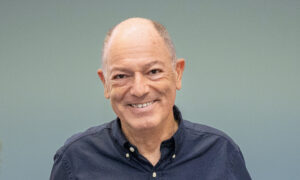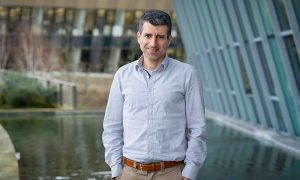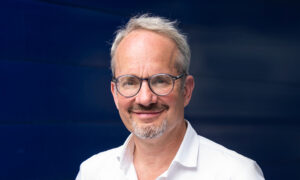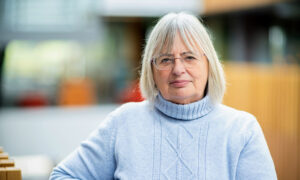
Welcome: Sara Cuylen-Häring
EMBL’s new group leader will explore biophysical properties of chromosomes and other cellular assemblies

Sara Cuylen-Häring, new group leader in EMBL’s Cell Biology and Biophysics Unit, studies how proteins regulate the separation of chromosomes and other important components within a cell.
What is the focus of your research?
My lab is interested in biophysical properties of chromosomes and other cellular assemblies that lack membranes – for example the nucleolus. The exciting feature of many of these membraneless organelles is their liquid-like character. It is thought that they form by liquid demixing, in a similar manner as oil and water separate into two phases. And similar to oil droplets in water they can coalesce and fuse. Therefore, the cell needs to regulate this process to prevent organelles from fusing in an uncontrolled manner. And that is what my lab is interested in. In my postdoctoral research, I found that a protein on the surface of chromosomes disperses mitotic chromosomes within the cytoplasm. In my own group, we will now explore how this protein functions mechanistically and if the cell uses similar surfactant-like proteins to separate other membraneless organelles.
I have been fascinated by chromosomes since I was a PhD student, when I realized how little we actually know about them!
How did you first get interested in this topic?
I started from a basic question in chromosome biology but my findings unexpectedly brought me to the emerging field of phase separation. I have been fascinated by chromosomes since I was a PhD student, when I realized how little we actually know about them! During my postdoc, I studied surface properties of chromosomes. I discovered that a single protein on the chromosome surface, Ki-67, prevents all the cell’s chromosomes from fusing into one big ball. It turned out that Ki-67 uses a surfactant-like mechanism that is well described for non-living phase separated systems, e. g. oil and vinegar mix in the presence of egg yolk as a surfactant. We now want to find out to what extent this concept also applies to cell biology.
Name one tool you can’t do without
When working in the lab, the one tool I most definitively rely on is a simple timer. I like to multitask and perform several experiments in parallel. I label and set several timers that beep when each of those experiments needs my attention.
What do you like about working at EMBL?
The collaborative atmosphere: at EMBL, it is easy to discuss and collaborate with other groups. This creates a wonderful working atmosphere and unexpected opportunities. One might end up doing things one would not have thought about or could not have done alone. For my field of research, for example, it is very important to talk to physicists and chemists. And luckily, I can meet them all here at EMBL.
What will you be looking for as you build your group?
I am looking for people who are excited about the research we are doing in my group. Specific technical skills or in-depth knowledge of chromosome biology are less important for me: these are attributes and can be learned. But you cannot teach traits like passion for research, curiosity or motivation. Moreover, I like to work with young scientists that are eager to learn and are not afraid of exploring completely novel techniques or research directions. Cutting-edge science is never predictable. Sometimes one might aim to answer one question, but then discover something entirely different and answer a question one would never have thought of.
At EMBL, it is easy to discuss and collaborate with other groups. This creates a wonderful working atmosphere and unexpected opportunities.
Can you recall a time when you have failed over the course of your career?
I am an optimistic person, so I usually forget about failures, but of course there are a lot of ups and downs in science. There are phases where experiments don’t make sense or totally fail and this can easily lead to frustration. But most discovery phases start like that: and when one gets unexpected results, that’s when one can really make progress. At first it might not seem to make sense and it feels like failure and frustration, but at some point, one might understand it in a new way. It is important to see these ‘lows’ as a time when there is potential for development and discovery.
If there was a motto hanging at your lab’s door, what would it be?
I like unconventional experiments, so my philosophy would be ‘any innovative idea is worth a try – even if it seems crazy or unlikely to work’.
Any innovative idea is worth a try – even if it seems crazy or unlikely to work!
What inspires you?
Presentations from people with different backgrounds, like physicists or chemists. Even if I don’t understand everything, it often inspires me to think differently about my scientific problem. Therefore, I try to find time to listen to talks unrelated to my direct field of research and get a new perspective. Outside of the lab, what inspires me the most is the great outdoors. My best ideas come when I am cycling. I remember that after I answered all the questions in my final high-school exam, I had a lot of time left. I read the answers and everything looked ok, so I handed the exam to the teacher. On my way home – after only 5 minutes on my bike – I realised I had made a mistake! I am not sure if it is due to the fresh air, the wind or being in nature, but on my bike is where I get my best ideas.


